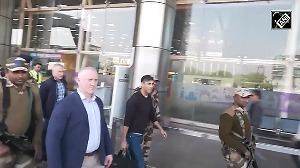Something is clearly cooking on the India-Russian front.
The two governments signed four agreements on Monday and did not sign a much-awaited intergovernmental treaty on setting up four Russian nuclear reactors in India, but much of the discussion between Prime Minister Manmohan Singh and Russian President Vladmir Putin was off-limits to discussion or media scrutiny.
 Indian government sources would only categorise the issues the two leaders discussed at their 130-minute one-on-one meeting -- perhaps the longest such meeting Dr Singh has held with any world leader -- at the Grand Palace at the Kremlin November 12, in broad, bland terms. "Defence cooperation." "Space." "Atomic energy." "Issues of common concern." "The situation in the neighbourhood." "How to take the relationship forward in the future." "The economic relationship." "How to take India-Russia trade to $10 billion by 2010."
Indian government sources would only categorise the issues the two leaders discussed at their 130-minute one-on-one meeting -- perhaps the longest such meeting Dr Singh has held with any world leader -- at the Grand Palace at the Kremlin November 12, in broad, bland terms. "Defence cooperation." "Space." "Atomic energy." "Issues of common concern." "The situation in the neighbourhood." "How to take the relationship forward in the future." "The economic relationship." "How to take India-Russia trade to $10 billion by 2010."
Yes, sensitive, strategic issues were discussed, the sources said, but insisted that no information on these subjects could be shared as they are "out of the public realm."
So sensitive are these issues that only National Security Adviser M K Narayanan was present at the 'strategic' discussions between Singh and Putin -- Foreign Secretary Shiv Shankar Menon, the other Indian official consulted at the one-on-one encounter, did not join in.
So secret were the discussions that the foreign office was kept out of it, one official, privy to the events, said.
Dr Singh and Putin's strategic exchange may have formalised what Narayanan discussed on his hush-hush visit to Moscow in late August and what Defence Minister A K Antony debated with his Russian counterpart Anatoly Serydukov in October.
India's strategic involvement with Russia," one senior government official said early on Tuesday morning, "is infinitely greater" than with any other country.
Russia, of course, continues to be India's largest supplier for defence material. Though the volume of Russian defence imports may have fallen marginally from the 80% and more from Soviet times, it still hovers around the 70% mark even after India's defence ministry expanded its suppliers to include Israel, France, Great Britain and the United States after the collapse of the USSR in the early 1990s.
The India-Russian defence relationship has also changed from the traditional buyer-supplier relationship to a buyer-supplier and co-producer of equipment equation. India now manufactures several Russian defence products locally, including the Brahmos supersonic missile, the T-90 tank and Sukhoi fighter aircraft.
The Russians have given India military expertise, which they have not given any other country, including its closest allies. The Russians feel most comfortable with India, a senior Indian diplomat told rediff.com in Moscow, on condition that he would not be identified by name for this report.
"They know we will never be a threat to them. We are a time-tested friend. And even though they are a big supplier of defence equipment to China," he said, "they are careful not to sell the Chinese any weapons that could be used against them in the future. The Russians have long memories and have not forgotten how the Chinese used Soviet weapons in the 1969 skirmishes near the Ussuri river."
In addition to the absence of a threat perception from the Indian side, the Russian armament supercomplex, the diplomat added, is also grateful for the infusion of much-needed funds after the Soviet Union collapsed.
"The Russian defence industry," he added, "has not forgotten how Indian money kept it alive in the early 1990s when they were starved for cash."
Russia no longer needs cash -- its monthly oil revenues are $6 billion; it has foreign exchange reserves of $148 billion, thanks to oil -- but it still pursues an aggressive India-Russia defence relationship, which has been further strengthened in the Putin era.
One of the most exciting India-Russia defence projects on the anvil is the joint development of a fifth generation fighter aircraft. The Russians have offered India the option to collaborate on the $10 billion project, both economically and technologically.
When fully developed and flown, this plane will be the most lethal and sophisticated aircraft in the skies, reportedly superior to the only fifth generation aircraft in operation, the American F/A 22 Raptor. Interestingly, perhaps as a reaction to the Russian offer, the Americans in June offered India another fifth generation fighter plane, the F-35, which, like the Russian aircraft, is also in development.
Though no communique was issued on the fifth generation aircraft after Monday's encounter, it is understood it is on course, as is the Russian proposal to lease India a nuclear submarine.
Both Foreign Secretary Menon and National Security Adviser Narayanan refused to answer rediff.com's question if the submarine had, in fact, been deployed in the Indian Navy. "Neither the Indians nor Russians will talk about it," a senior Russian journalist told this reporter at the Kremlin on Monday, "the submarine will quietly be absorbed in the Indian fleet" before the information is made public.
The Nerpa class nuclear submarine, developed at the Amur shipyard and incorporated into Russia's Pacific fleet earlier this year, is the most advanced Russian nuclear attack submarine. It can be equipped with 28 nuclear-tipped Cruise missiles. The lease, which may cost India about $650 million, will add a lethal edge to the Indian Navy's fighting abilities; there is speculation that Indian naval officers and sailors are already in Russia in training for this assignment.
It is not as if the India-Russia defence relationship is trouble-free. Indian defence ministry officials have frothed at the long delay in delivering the Admiral Gorshkov, the aircraft carrier India bought from Russia in 2004 for $1.5 billion.
With the nation's sole aircraft carrier, the INS Viraat near retirement, the Indian Navy is anxious that the INS Vikramaditya, as the Gorshkov will be known, is quickly deployed. But that is not to be. The Russians have kept shifting the dates for delivery.
Since the aircraft carrier has virtually to be rebuilt to suit Indian requirements, the Russians reportedly felt the price tag was insufficient to cover the redevelopment costs. As Eduard Borisov, director of the Sevmash shipyard in Severodvinsk, northern Russia, which is working on the ship, said in an interview in August, 'We are practically rebuilding a new ship using an old hull and changing everything else.'
The cost may only be one part of the story; it could just be that the Russians lost track of the assignment. Vladmir Pastuknov lost his job as director of the Sevmash shipyard this year over the delay.
The Russians also held out for a cost-escalation clause in other defence agreements, asking for an 18% annual increase in the price of all equipment before it was delivered. Like all buyers -- and perhaps in the national bargaining spirit -- the Indians held out for an annual 2.8% cost escalation fee.
When in May the issue of Russian supplies became a serious issue for the services, defence ministry officials hastened twice to Moscow to sort out the issue. India will now pay an annual 5% cost escalation fee, which could cost the nation over an estimated $50 million every year.
Since the cost escalation agreement was reached, the vexed issue of defence supplies has been sorted out to some extent, but there is still no word on when the navy can expect the INS Vikramaditya. The navy would like the ship delivered in 2009, but given the extent of work, the Russian newspaper Izvestia said it could be as late as 2011.
There is also some speculation whether India and Russia are involved in a new strategic collaboration over Afghanistan. After the Taliban captured power in Kabul, India, Iran and Russia actively supported the anti-Taliban resistance, especially Ahmed Shah Masoud's Northern Alliance, with weapons, medical and other supplies.
In recent years, all three former allies find themselves in different corners in Afghanistan. As a reaction to American hostility, the Iranians are said to have opened up lines of support to the Taliban.
The Indians, who are building a lot of infrastructure in Afghanistan, are more aligned with the Americans, provoking one Indian commentator to call India 'America's poodle' in Afghanistan.
The Russians, the afore-quoted Indian diplomat said, are seriously worried about the recent Taliban-inspired turbulence in Afghanistan, apprehensive that some of it could easily migrate across porous borders to important allies like Uzbekistan, which is the likeliest candidate for an Islamic revolution.
"The Russians only lost two wars in the 20th century," the diplomat added, "with Japan in 1904 and in Afghanistan. They are wary of any direct involvement (to curb the Taliban, which is making inroads even in northern Afghanistan, not its traditional base), but now find themselves with little influence in that country."
On Thursday, November 8, the Cabinet Committee on Security met in New Delhi to okay the deals that would be signed in Moscow. It is likely that one of them could have been the intergovernmental agreement for Russia to build four nuclear reactors in India, a proposal which the Indian side is said to have abandoned on the eve of the Singh-Putin encounter, fearing a new nuclear complexity to an issue that has virtually paralysed the Union government since late August. Or did the CCS grant the prime minister the sanction to go ahead with strategic proposals that the Indian public will only learn about some time from now? Or maybe, never at all.
Photograph: Prime Minister Manmohan Singh and Russian President Vladmir Putin, centre, at their media interaction at the Grand Palace at the Kremlin, November 12. Photograph: Nikhil Lakshman






 © 2025
© 2025